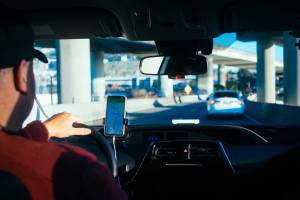
Legal Battle Unleashed: Amazon, Uber, and Lyft Take Seller to Court Over Unauthorized Rideshare Signs
Amazon, Uber, and Lyft have all filed a lawsuit against Gary Hutton and his company, Huttronics LLC, in an effort to combat the sale of counterfeit goods. Hutton is being sued for trademark infringement, misleading advertising, and breaking the Washington Consumer Protection Act in a lawsuit filed in U.S. District Court in Seattle. The corporations are asking for monetary damages and an injunction.
According to the complaint, Hutton used a third-party seller account on Amazon.com to peddle fake LED window signs emblazoned with the Uber and Lyft logos. The signs, which were for sale between February 2018 and August 2019, caused many to worry about their safety. The complaint claims that riders’ safety is put at risk because unscrupulous people purchased and used the placards for their own ends.
The complaint draws attention to the dangers of buying and using fake rideshare signs. Uber and Lyft only allow their approved drivers to use decals that have been provided by the companies themselves. Hutton may have put riders in danger by selling fake signage that look like the real thing.
Hutton counters that the rideshare and delivery drivers who bought his placards did so to increase their own personal security. He said that the illuminated signage helped to establish their credibility as professionals, particularly after dark. Hutton admits he used Uber and Lyft trademarks on the banners, but claims the firms lost no money because they don’t sell the signs.
Amazon’s lawsuit against Hutton is a part of its larger campaign to eliminate sales of fake goods. Amazon has been accused of allowing counterfeit goods to be sold on its third-party marketplace in the past. Recently, the corporation has joined up with other well-known brands to sue alleged counterfeiters, such as Uber and Lyft.
Hutton’s Amazon seller account was suspended in September 2021 after the lawsuit was filed. On May 24, deputies with the Los Angeles County Sheriff’s Department served a search warrant at Hutton’s residence, during which they found and arrested Hutton on counterfeiting charges. Hutton may think this is a minor matter, but it demonstrates Amazon’s seriousness about stopping brand infringement.
Amazon has numerous anti-counterfeiting measures and strategies in place. Three examples include Transparency, the Brand Registry, and Project Zero. Brand Registry aids brand owners in safeguarding their intellectual property, while Project Zero empowers brands to aggressively delete counterfeit entries themselves. Conversely, with transparency, buyers may check the legitimacy of products with serial numbers.
It appears that the company’s efforts are paying off. The number of reported efforts to open new selling accounts on Amazon to peddle fake items has dropped significantly, the company said. The number of such attempts Amazon blocked in 2022 was 800,000. This was down from 2.5 million in 2021 and 6 million in 2020. Amazon’s seller verification procedure is very thorough, and the company has detection systems in place that use machine learning to identify fraudulent accounts.
The complaint has prompted responses from both Lyft and Uber. Lyft highlights its dedication to rider safety and partnership with Amazon to eradicate unauthorized Lyft branding. The business recommends that riders double check the vehicle’s license plate, driver’s name, and driver’s photo in the app before entering the vehicle.
While Uber acknowledges that official decals and signs can assist clients find a driver, the company stresses the need of double checking trip details in the app. Riders are strongly encouraged to verify the vehicle’s make and model, license plate number, and driver’s name and photo before entering the vehicle. Uber is working with Amazon and Lyft to eradicate fake car branding in an effort to maintain the reliability and security of the Uber platform.
First reported on Geek Wire





